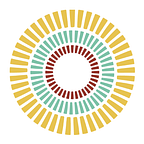The Day I Saw Red
Olaoluwa’s first period was cause for celebration — so why was it shrouded in silence?
When I was seven years old, I saw my aunty throw her menstruation rags into a bowl of clean water, which immediately turned crimson red! I was instantly full of questions.
In general, I was an inquisitive child. Once, I asked my mother why my brother had fuller jeans in front than I did. I cannot remember her exact response, but I know it left me with even more questions on the topic of gender differences. Of course, when I saw my aunty washing her menstruation rags, I asked her the questions that were brewing in me. I was excited to learn that on one special day, I too would see red.
Fast forward to age 10. I was enrolled at an urban all-girls secondary school and menstruation was the trending topic. There were heated debates in the classrooms and dormitories about who we guessed had “started” or not. While unpacking our luggage in the dormitory, the sight of a pack or two of sanitary towels in any girl’s box elicited giggles and excitement.
I secretly envied the few girls who gathered in corners and spoke in hushed tones about their menstrual cramps and the quality of various brands of sanitary products. These circles were sacred and those of us who still awaited the esteemed visitor were automatically banned from the gathering of “women”. The day one of the privileged menstruating girls stained her school skirt, the others shielded her “shame” in solidarity. They preserved her secret as if it was a mission to protect national intelligence.
I had just turned 11 when my first period finally came. During opening prayers at a Christian fellowship center in the neighborhood, I felt pressure in my lower abdomen. This was soon followed by an uncomfortable wetness in my panties. I knew this was it!
I scurried home and went straight into the toilet to check my panties for confirmation and then summoned my mother. The last time I had seen her this joyful was when I clinched the first position in my third year of primary school.
“You are now a woman,” she said to me. She instructed me to take a cool bath and change my underwear. When I came back, she opened a box of old clothing and briskly tore one of her wrappers into several pieces of cloth. Since there were no sanitary towels at home, I had to make do with these rags for a while. They felt uncomfortable and too heavy to hold in my panties. Worse still, the pressure in my lower abdomen quickly became excruciating pain. My mother asked me to bear the pain quietly. No one else could know about it, she said.
On the brighter side, I was a star at home that week. My mother gave me the biggest piece of chicken every day and when my brother asked questions, he was tersely told that I had become a woman.
My brother was not allowed to play with me too much or let any boy come near me. There was a noticeable change in my dad’s attitude towards me. When I eventually overheard him ask my mum in a hushed tone if it was not too early for me to menstruate at 11, my embarrassment knew no bounds.
Now that I am an adult and a vocal girls’ rights advocate, I see that things haven’t changed much since I was a girl. The silence, embarrassment, and shame around menstruation still lingers. Once, I found one of the adolescent girls I work with holding her belly and writhing in pain. It took 15 minutes to convince her that it was okay to admit that she was experiencing menstrual cramps.
My girls’ rights advocacy NGO in Nigeria, Girl Pride Circle, has launched the “Cool Period Movement”. This girl-led campaign is re-branding menstruation as a healthy, natural, and cool biological process that girls should be proud of. We share accurate menstruation information through seminars, simulations, and dramatic skits in after-school education clubs.
I met some amazing young women through a fellowship in Qatar and together we identified the provision of sanitary products as a way to keep more girls in school. The other fellows have been spreading the word and we have now raised enough money to provide a school term’s worth of eco-friendly and safe sanitary towels for 33 underprivileged adolescent girls in Nigeria, to commemorate the 2017 Menstrual Hygiene Day.
We are also exploring innovative advocacy strategies to amplify our voices on the crucial links between adequate water, sanitation, and hygiene facilities and girls’ education in Nigeria. For example, my team is planning a documentary series which will form the basis of a social campaign. In these documentaries, girls and young women will speak boldly about our needs for optimum menstrual health and ways the government, private sector, and civil society can make it a reality.
Now more than ever, there is a nagging need to empower girls with accurate knowledge about menstruation. They need safe spaces where they can broach every unspoken issue and break down age-old myths. This will enable them manage their periods better and feel more comfortable in their own skins — as girls who are proud of their girlhood and equipped to lift up their communities on their powerful shoulders.
How to Get Involved
Olaoluwa invites you to like the Girls Pride Circle Facebook page to stay in the loop and join the #CoolPeriodsMovement conversation.
This story originally appeared on WorldPulse.com, a social networking platform connecting women worldwide for change. In the lead up to Menstrual Hygiene Day (May 28), share your own experiences with menstruation for a chance to be published. We’ll be curating stories from all over the world in the coming weeks. Learn more.
